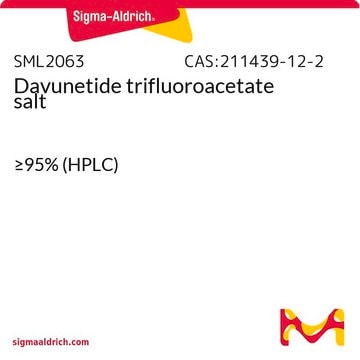16350
Bromobenzene
≥99.5% (GC)
Synonym(s):
1-Bromobenzene, Bromobenzol, Monobromobenzene, Phenyl bromide
About This Item
Recommended Products
vapor density
5.41 (vs air)
vapor pressure
10 mmHg ( 40 °C)
Assay
≥99.5% (GC)
form
liquid
autoignition temp.
1051 °F
expl. lim.
36.5 %
refractive index
n20/D 1.559 (lit.)
n20/D 1.559
bp
156 °C (lit.)
mp
−31 °C (lit.)
solubility
alcohol: soluble 10.4g/100g at 25 °C
diethyl ether: soluble 71.3g/100g at 25 °C
water: insoluble 0.045g/100g at 30 °C (practically)
benzene: miscible
chloroform: miscible
hydrocarbons: miscible (petr.)
density
1.491 g/mL at 25 °C (lit.)
SMILES string
Brc1ccccc1
InChI
1S/C6H5Br/c7-6-4-2-1-3-5-6/h1-5H
InChI key
QARVLSVVCXYDNA-UHFFFAOYSA-N
Looking for similar products? Visit Product Comparison Guide
Application
Biochem/physiol Actions
Signal Word
Warning
Hazard Statements
Precautionary Statements
Hazard Classifications
Aquatic Chronic 2 - Flam. Liq. 3 - Skin Irrit. 2
Storage Class Code
3 - Flammable liquids
WGK
WGK 2
Flash Point(F)
123.8 °F - closed cup
Flash Point(C)
51.0 °C - closed cup
Personal Protective Equipment
Regulatory Listings
Regulatory Listings are mainly provided for chemical products. Only limited information can be provided here for non-chemical products. No entry means none of the components are listed. It is the user’s obligation to ensure the safe and legal use of the product.
FSL
Group 4: Flammable liquids
Type 2 petroleums
Hazardous rank III
Water insoluble liquid
ISHL Indicated Name
Substances Subject to be Indicated Names
ISHL Notified Names
Substances Subject to be Notified Names
JAN Code
16350-500ML:
16350-BULK:
16350-100ML:
16350-VAR:
16350-1L:
Certificates of Analysis (COA)
Search for Certificates of Analysis (COA) by entering the products Lot/Batch Number. Lot and Batch Numbers can be found on a product’s label following the words ‘Lot’ or ‘Batch’.
Already Own This Product?
Find documentation for the products that you have recently purchased in the Document Library.
Customers Also Viewed
Our team of scientists has experience in all areas of research including Life Science, Material Science, Chemical Synthesis, Chromatography, Analytical and many others.
Contact Technical Service














